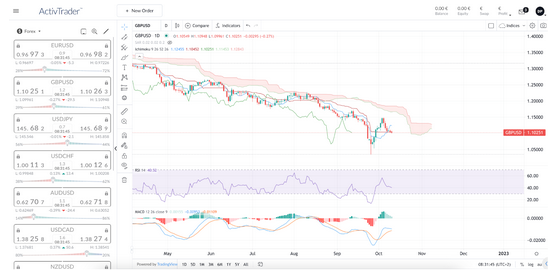The new Truss administration has struggled through a challenging couple of weeks. A so-called "mini-budget" was the vehicle through which Finance Minister Kwasi Kwarteng introduced a host of brand-new fiscal policies on September 23rd. Among these were decreases to income tax rates that were not accompanied by funding, as well as the cancellation of an increase in corporation tax rates that had been announced.
The value of the pound dropped significantly as shown in the chart below, and interest rates on United Kingdom government bonds, which are sometimes referred to as "gilts," surged, which has forced the Bank of England to intervene, as we will see later. Both assets have not yet recovered to the levels they were at before the news…

GBP/USD Chart - Source: ActivTrader Online Trading Platform from ActivTrades
BOE deploys additional support to the flailing bond market
The Bank of England (BOE) announced a brief and targeted intervention last week on Wednesday, September 28th, to re-establish market functioning in long-dated government bonds and reduce the risk of contagion to credit conditions for the UK public and companies.
This was done in an attempt to calm the market and save liability-driven investment funds (LDIs) from imminent collapse, against what the bank called a “backdrop of an unprecedented repricing in UK assets.” As new finance minister Kwasi Kwarteng announced his preliminary budget last month, spiking gilt yields to new highs and prompting lenders to issue margin calls.
The ‘mini-budget,’ which was originally due to be published in its full form on the 23rd of November, has been a source of controversy and questions for many so far. With the release date moved forward, it’s now due on the 31st of October, when Kwarteng releases his medium-term fiscal plan. This, of course, includes a much-anticipated plan for how the almost unprecedented tax-cutting measures will be paid for, and the date change will give the BOE enough time to consider what impact it will have on future interest rate rises.
Further support needed
With the end of the purchase scheme on the 14th October in sight, the BOE stated on the 10th of October that it would be taking further measures to guarantee a successful conclusion to the plan. This is despite having purchased significantly less than the daily minimum amount.
So far, the BoE has only acquired roughly 5 billion pounds' worth of gilts, although offering to buy up to 40 billion pounds' worth.
"In the final week of operations, the Bank is announcing additional measures to support an orderly end of its purchase scheme," the central bank stated
On Monday, the maximum amount that could be auctioned off was set at 10 billion pounds, but the central bank did retain the right to lower bids if necessary.
As pension funds were caught up in the turbulence, the BOE announced it would introduce a temporary enlarged collateral repo facility to assist banks to reduce liquidity strains that were confronting client funds.
The bank said that its liquidity insurance activities will continue through the end of this week and take a broader variety of collateral than normal, including corporate bonds.
The BOE also said that it was ready to support the further easing of liquidity difficulties affecting liability-driven investment funds via its weekly Indexed Long Term Repo operations each week on Tuesdays.
The Bank further mentioned that in order to ensure that the LDI sector operates on a more stable footing moving ahead, it will keep working in conjunction with the appropriate UK authorities and regulatory organizations when this week's activities are completed.
Earlier today, the Bank of England revealed that it will expand the scope of its daily gilt purchase operations to include the acquisition of index-linked gilts in addition to traditional gilts from the 11th of October until the 14th of October. For more details, check out the announcement.
Rating agency Fitch believes growth prospects in the United Kingdom are gloomy
Speaking at the JPM Techstars conference in London, JPMorgan Chase (NYSE:JPM) CEO, Jamie Dimon, declared to CNBC that ‘every government should be focusing on growth’ - and this is especially true for countries having such a hard time with pessimistic growth prospects.
Last Wednesday, the rating agency Fitch gave a crushing assessment of the government's fiscal policies as well as its political legitimacy, and as a result, it cut the countries’ outlook from “stable” to "negative". Yesterday, the rating agency also warned that a deeper UK recession should be expected. Fitch believes that the UK GDP will now decline by 1% in 2023 (against a decline of 0.2% in its Global Economic Outlook published in September).
The main reasons cited were the “extreme volatility” of the local markets and the expectation of higher and faster upcoming interest rates.
“We now expect much more rapid rises in the policy rate as the BoE seeks to offset the impact of looser fiscal policy and a weaker currency on inflation, buttress investor confidence in sterling assets and demonstrate its independence in the face of increased financial market concerns about fiscal dominance. We now anticipate the policy rate rising from 2.25% to 4.25% by December 2022 and 5.0% by 2Q23 (compared to our previous forecasts of 3.0% and 3.25%, respectively), slightly below market expectations,” the commentary states.
